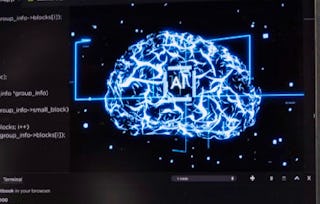Artificial intelligence is rapidly advancing from simple automation to systems that can reason, plan, and act on their own. Building Autonomous AI Agents is a hands-on, practice-driven course that walks you through the end-to-end process of designing, developing, and deploying intelligent agents capable of independent decision-making.

Gain next-level skills with Coursera Plus for $199 (regularly $399). Save now.

Building Autonomous AI Agents
This course is part of Autonomous AI Agent Systems and Orchestration Specialization

Instructor: Edureka
Included with
Recommended experience
What you'll learn
Understand the core architecture and components of autonomous AI agents.
Build and orchestrate multi-agent systems using frameworks.
Integrate memory, reasoning, and tool-use capabilities into AI workflows.
Apply ethical, safety, and evaluation frameworks for trustworthy agent deployment.
Skills you'll gain
- CrewAI
- AI Orchestration
- Data Ethics
- Large Language Modeling
- Tool Calling
- Systems Integration
- Prompt Engineering
- LangChain
- Human Factors (Security)
- Agentic Workflows
- AI Workflows
- LLM Application
- Generative AI Agents
- Responsible AI
- Retrieval-Augmented Generation
- Artificial Intelligence and Machine Learning (AI/ML)
- LangGraph
- Context Management
- Restful API
- Agentic systems
Details to know

Add to your LinkedIn profile
November 2025
See how employees at top companies are mastering in-demand skills

Build your subject-matter expertise
- Learn new concepts from industry experts
- Gain a foundational understanding of a subject or tool
- Develop job-relevant skills with hands-on projects
- Earn a shareable career certificate

There are 4 modules in this course
This module introduces learners to the foundations of single AI agents using the ReAct framework. Learners will explore the core concepts of agentic reasoning, tool usage, and memory integration. Through hands-on exercises, they will set up a development environment, define and use tools with structured inputs, and implement the ReAct loop for reasoning and decision-making. By the end of this module, learners will be able to deploy a functional agent capable of performing tasks with structured reasoning and short-term memory.
What's included
15 videos6 readings4 assignments
This module focuses on enabling a single agent to access, process, and act on external knowledge. Learners will work with retrieval-augmented generation (RAG) pipelines, including data ingestion, text embedding, and vector database indexing. They will integrate tools and actuators to enable decision-making and apply grounding techniques to ensure the agent produces contextually accurate outputs. By the end of this module, learners will have built a “strategy-grounded” agent that can reason over knowledge sources and generate validated outputs.
What's included
10 videos4 readings4 assignments
This module introduces learners to orchestrating, validating, and deploying single AI agents using LangGraph. Learners will design execution graphs, implement validation nodes, and integrate reflection loops for self-correction. They will also explore human-in-the-loop techniques and conditional logic for decision-making. Finally, learners will package their agent as a RESTful API, monitor its performance, and scale workflows for robust operation. By the end of this module, learners will have a fully operational, production-ready agent capable of autonomous task execution.
What's included
10 videos4 readings4 assignments
This module provides learners with an opportunity to synthesize their knowledge and demonstrate mastery of single-agent AI workflows. Learners will review key concepts from agentic foundations, RAG pipelines, and LangGraph orchestration. They will complete graded assessments, including scenario-based exercises and end-of-course knowledge checks, to apply their understanding in practical contexts. By the end of this module, learners will be able to confidently design, implement, and evaluate a fully functional single AI agent capable of reasoning, tool use, and executing grounded tasks.
What's included
1 video1 reading2 assignments
Earn a career certificate
Add this credential to your LinkedIn profile, resume, or CV. Share it on social media and in your performance review.
Explore more from Software Development
 Status: Free Trial
Status: Free Trial Status: Free Trial
Status: Free Trial Status: Free Trial
Status: Free Trial Status: Free Trial
Status: Free Trial
Why people choose Coursera for their career





Open new doors with Coursera Plus
Unlimited access to 10,000+ world-class courses, hands-on projects, and job-ready certificate programs - all included in your subscription
Advance your career with an online degree
Earn a degree from world-class universities - 100% online
Join over 3,400 global companies that choose Coursera for Business
Upskill your employees to excel in the digital economy
Frequently asked questions
AI agents can not only chat but also take actions, use tools, and remember things to complete tasks. Regular AI models mainly generate text without acting or remembering.
You only need basic Python knowledge. Step-by-step instructions are provided for all coding exercises, so beginners can follow along easily.
ReAct stands for Reasoning + Acting. It teaches agents to think, take action, observe results, and improve, making them smarter than standard AI models.
More questions
Financial aid available,
¹ Some assignments in this course are AI-graded. For these assignments, your data will be used in accordance with Coursera's Privacy Notice.

